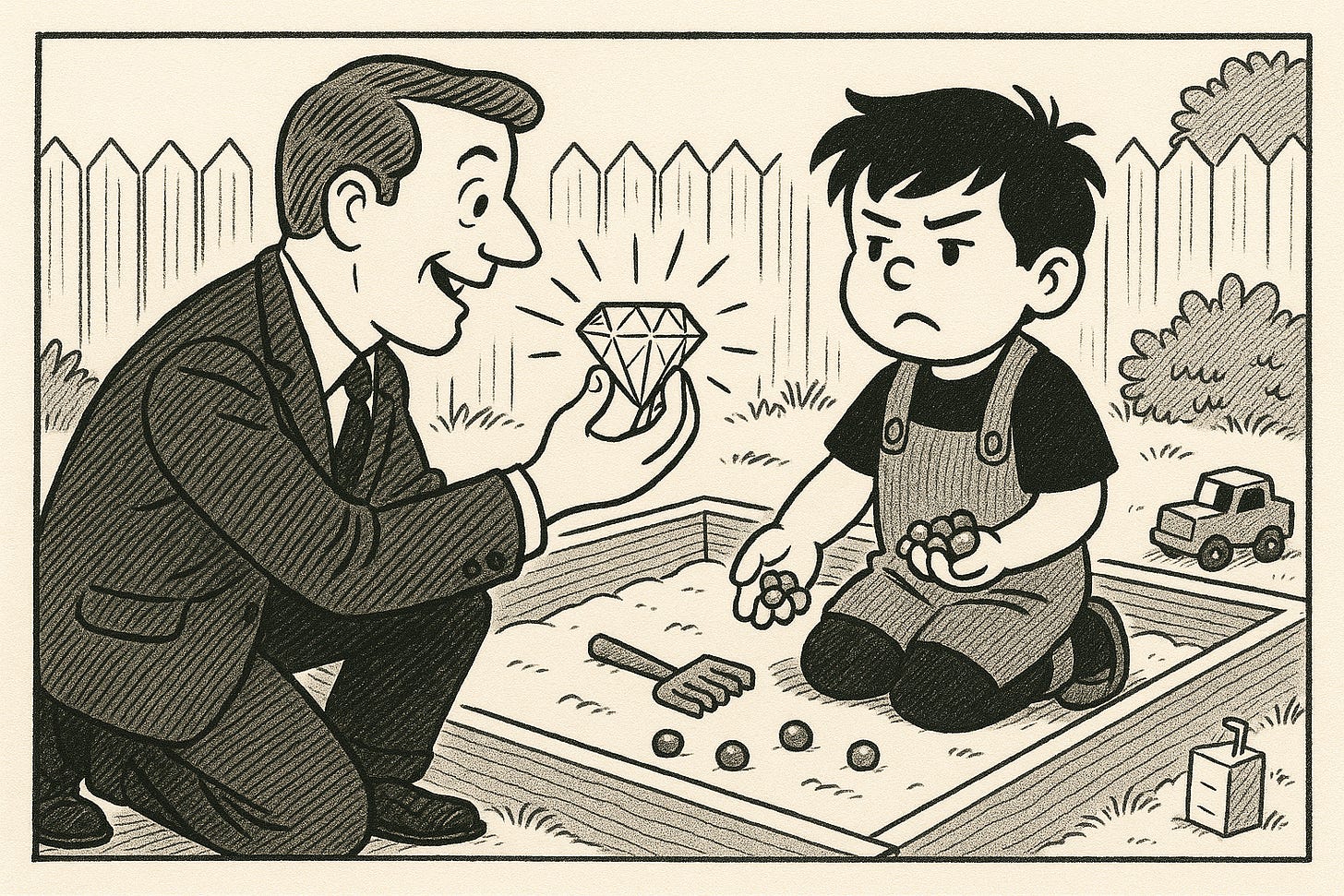Stop Selling Diamonds to People Who Want Glass (#9)
Align your quality to the moment
Imagine you're a jeweler. A customer walks in asking for something shiny, affordable, and “good enough for now.”
Do you show them a flawless, D-color, VVS1-cut diamond that took weeks to source?
Of course not.
You show them something beautiful, functional, and appropriately priced. You do this to match the moment and the need.
The same applies to writing.
If you’re crafting a release note for a service release with no new features, chasing linguistic brilliance is a waste. Your effort is misaligned with the task.
Your best writing purposefully delivers the right level of quality. Still, we writers miss this all the time.
We polish until the verbs gleam. We shave syllables like we’re carving a katana. We chase clarity like it’s a moral virtue. We think everything we ship should be great.
But not everything deserves our best work.
Misplacing your effort
Gauging the right level of quality is hard, especially when you want to produce good content.
But here’s an uncomfortable reality: most people can’t tell how good your writing is. They skim for answers and move on. They’re not evaluating your craft. They’re looking for utility, precision, and signal.
That’s why your job is to meet the reader’s needs, not your own standard of polish.
And that’s where misplaced effort creeps in:
You give too much where less is needed.
You give too little where more is required.
Let’s talk about both.
Over-Delivering Feels Safer
Over-delivering feels like the high road. It looks responsible. It feels defensible. But it drains your best energy into places that don’t return it.
You spend hours refining phrases in an article no one reads, while your onboarding guide still points to a deprecated feature. You polish the part that doesn’t matter, and neglect the one that actually helps someone.
Research by Nielsen Norman Group estimates that users read about 20% of the words on an average web page.
They’re not admiring your transitions. They’re scanning for answers. If your effort goes into parts the reader never touches, they won’t notice the quality. They’ll only notice if their question isn’t answered or their problem isn’t solved.
Over time, this starts to wear on you. It’s not just the hours wasted, but the sense that your best work lives in places no one sees. You begin to hesitate. You begin to save your edge, even when it’s needed. And eventually, you forget what it feels like to go all-in for the right reasons because all-in stopped paying off.
Oscar Wilde captured this perfectly in The Nightingale and the Rose.
A student longs for a red rose to win a girl’s affection. A nightingale hears his sorrow and sacrifices everything, singing all night with her breast against a thorn to craft the perfect bloom.
In the morning, the student presents the rose. The girl shrugs. It doesn’t match her dress. She prefers the jewels someone else gave her.
He tosses the rose into the gutter. A cart crushes it. Then the student returns to his books, deciding love is pointless.
The Nightingale gave her life.
No one noticed.
Not every page needs your best effort. Not everyone deserves it. Don’t bleed brilliance into the void.
Under-Delivering is Easy to Excuse
Let’s flip the coin.
Once you’ve seen how few people engage deeply with your writing, there's a temptation to consistently lower the quality of your output. Few people read the whole article. No one comments on the structure.
So, you deliver average work that is clear enough, fast enough, and safe enough.
However, some projects aren’t routine. Some readers are paying attention. Some moments demand more than recycled clarity. If you’ve trained yourself to regularly deliver average work, you might start forgetting how to produce high quality work when the situation demands it. You get lazy. You rely too much on your perception of your innate writing talent and strategy.
In the fable of The Tortoise and the Hare, the hare is fast. He’s faster than anyone. So, he coasts. He gets lazy. He naps mid-race because he assumes his natural advantage will always be enough.
It isn’t.
With a slower, deliberate, focused effort, the tortoise passes the hare and wins. The tortoise wasn't a better racer. He merely matched his effort to the race.
The hare doesn’t lose from a lack of talent. He loses because he underperforms in a race that was his to win. He treats the moment like it doesn’t matter.
Writers do this too.
You’ve probably done work like this. So have I. You think: "This is a minor metric definition, minor feature flag, or basic help article." You default to what’s worked before. You assume no one will notice, but sometimes people do. When people notice your default work doesn't meet the moment, the moment moves past you and people start questioning if they overestimated the quality of your output.
You don’t want to be the writer who could’ve won the race but stopped running halfway through for a nap.
Keep reading with a 7-day free trial
Subscribe to Refined Draft to keep reading this post and get 7 days of free access to the full post archives.




